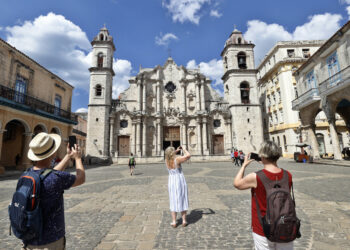Anyone who has ever had the pleasure of traveling to Cuba knows that the Miami-to-Havana flight goes by almost like the blink of an eye; it is not just any flight.
The abnormal situation begins the moment you decide to travel. That decision brings on a real mixture of feelings, including old resentments that you had forgotten about, or at least preferred not to remember.
A sweeping, indiscreet glance is enough to detect uncertainty and anxiety among the passengers. Each has his or her own reasons; each person is a walking history; every boarding pass is a ticket into a time machine.
I am sitting in 1D, an aisle seat, on the left side of the plane. I don’t usually take a window seat, and I only scoot over to the window to scan the Cuban coastline. As soon as I can see it, I almost always feel like I can embrace it. But this time that won’t be possible, because I have company. A young woman is seated next to me. She is slender, almost blond, dressed in a sleeveless white blouse, worn-out leather sneakers and simple blue jeans. She seems to be subdued, as if talking would betray the sadness reflected on her face or simply give away her simple nature. She rests her head against the window and closes her eyes, hiding the tears. No emotions spring forth from her; she is not infected by the happiness that prevails among the other passengers, and she seems to be divided, forced, with her heart split between the two coasts.
I don’t know who she is, but I offer her my jacket when I see that she has goose bumps from the cold. She accepts and thanks me, “Thank you, Cancio. My father and I were talking about you a few days ago. I wanted to go to the Buena Fe (Cuban music group) concert, and we were wondering if you were the person who had brought them over. He loves Buena Fe.” For a few moments, the sadness had dropped away from her face. Why didn’t he go? I asked her, intrigued. “He can’t, or he shouldn’t,” she answered disconsolately, with her eyes clouding. “Are you visiting Cuba?” I changed the subject to see if I could get a smile. “I live in Cuba. I’m coming home from visiting my father.” “Ah, your parents live in Miami?” I asked with curiosity.
“It’s a very long, sad story. This 45-minute trip wouldn’t be long enough to tell it.”
I looked at my watch. We only had five minutes of flight left. For a few seconds, she turned toward the window. We were flying over Cuba. The red-colored earth seemed to bring color back to her face, and she continued. “My father was unjustly sentenced to many years of prison. A little over a year ago, he was freed on conditional release, and they won’t let him return to Cuba to be with his family. They won’t let my mother or younger sister come to visit him; they won’t give them a visa. It’s up to me to visit him when I can; I have a young child.”
Her story sounded familiar to me, and just when I was beginning to figure it out, we were interrupted by the announcement that we were landing, followed by the passengers’ euphoria and applause, which never fail. It was then, as we walked toward the exit amid shouts and confusion, that I asked, even though I already knew the answer: “And who is your father?”
“My father is René.”










If your father is going to be remembered for being a member of the most famous Cuban quartette “Los Safiros”; you will be remembered for being an Aruca’s clone. How is it possible that you advocate for a convicted spy and do not have the courage to demand Alan Gross release? His only fault was to bring in computer and network technology to allow Hebrews getting access to the Internet. At least, René’s daughter can visit her father. Mr. Gross was not allowed attending her mother funeral and is fading away in a Cuban jail.